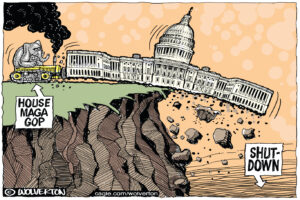An Economic Bridge to Nowhere
House Republicans were able to keep an extension of unemployment benefits out of the recently announced stimulus package, which is too bad, since it's one measure that would actually help the ailing economy.WASHINGTON — Ask an economist to explain a recession and you’ll likely get a description that involves declining demand, slowing production and an accounting of this or that “excess” in the economy (this time, it’s screwy mortgage lending and the housing bubble) that has to be wrung out of the system before things can be set right.
Ask a worker to describe a recession, and it’s much simpler: It’s when people lose their jobs.
This is why in every recession since 1958, Congress has enacted a temporary extension of unemployment benefits beyond the customary 26 weeks of payments made by states. The stopgap benefits keep families afloat during times when jobs are scarce and the duration of a jobless period can lengthen well beyond six months.
The money flows quickly through a system that’s already in place — no new bureaucracy is needed to dispense it. The cash goes to people who have been directly affected by the downturn, not to those who may never really feel the pinch. That’s why the Congressional Budget Office recently rated extending unemployment benefits (along with temporarily enhancing food stamp benefits) the most efficient and effective of the ideas proposed for inclusion in an economic stimulus package.
Looking back on the experiences of long-term unemployment insurance recipients during the recession of 2001, for example, the CBO found that average family income was half of what it had been when a recipient was working. About a third of these families saw their incomes fall below the poverty line, and 40 percent lacked health insurance. Mark Zandi of Moody’s Economy.com has estimated that every $1 increase in unemployment insurance benefits generates a short-term boost of $1.64 in gross domestic product.
Unemployment insurance is such a surefire way to get money to people who will spend it immediately that, historically, it has been called an “automatic stabilizer.”
Now House Republican leaders are calling it “extraneous spending.”
The bargain that led the Bush White House and the bipartisan leadership of the House to reach a deal on an economic stimulus package was that the Democrats had to drop demands for government spending of any kind — even spending that puts money directly into the pockets of people who’ve lost their jobs. In exchange, the Democrats won tax rebates for some wage earners who pay Social Security and Medicare payroll taxes, but do not earn enough to pay income taxes.
That’s better than failing to give these workers anything at all. But there isn’t anything logical about agreeing that low-wage workers need a break, while somehow the unemployed do not. Unemployment insurance isn’t welfare. It’s not pork-barrel spending or any sort of boondoggle. It is designed precisely for times like these, when workers are laid off and can’t easily find new work because of overall economic sluggishness.
In fact, the system has long been neglected while the very nature of work has evolved. Part-time workers who are laid off usually aren’t covered by unemployment insurance, leaving millions — particularly women — without this safety net. In many states, a worker must certify that he or she is looking for full-time work in order to be counted as among the unemployed, even if the job that’s been lost was a part-time position and even if other common eligibility tests are met. Gaps in the unemployment system already have reduced the percentage of unemployed workers who actually receive benefits to under 40 percent, according to an analysis by the Center on Budget and Policy Priorities.
A broad overhaul is overdue. But trying to achieve this in the teeth of a looming recession, when the political impetus is to act quickly on a stimulus plan, shouldn’t be tried.
Ideological illogic shouldn’t trump proven effectiveness, either. Yet that’s the root of Republican objections to extending unemployment benefits as part of the stimulus package. The House Republican leaders, John Boehner and Roy Blunt, in announcing the agreement last week, cited unemployment benefits as “extraneous spending” — and crowed about keeping them out of the package.
Aiding the unemployed is not the moral equivalent of building a bridge to nowhere. No policy currently under discussion — including those tax rebates you may already be counting on — is better targeted or delivered more quickly. The Senate, which begins writing its own stimulus package this week, must help the jobless who are the very face of recession.
Marie Cocco’s e-mail address is mariecocco(at)washpost.com.
© 2008, Washington Post Writers Group
Your support matters…Independent journalism is under threat and overshadowed by heavily funded mainstream media.
You can help level the playing field. Become a member.
Your tax-deductible contribution keeps us digging beneath the headlines to give you thought-provoking, investigative reporting and analysis that unearths what's really happening- without compromise.
Give today to support our courageous, independent journalists.






You need to be a supporter to comment.
There are currently no responses to this article.
Be the first to respond.